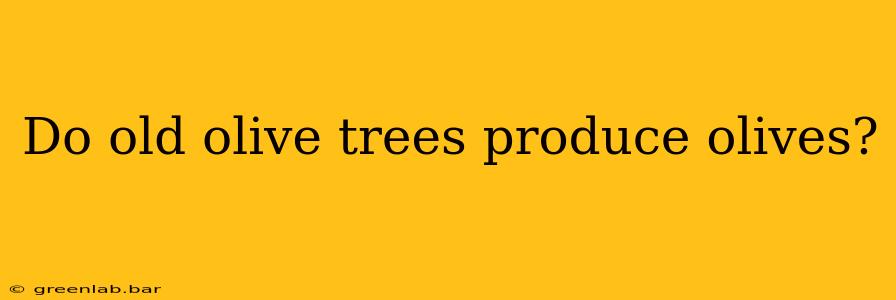Olive trees ( Olea europaea) are renowned for their longevity, with some specimens boasting lifespans exceeding a thousand years. But does this remarkable lifespan translate to continuous olive production? The answer is nuanced and depends on several factors. While an ancient olive tree might not yield the same quantity of olives as a younger, more vigorous tree, it's certainly capable of producing fruit, albeit often in smaller amounts.
Factors Affecting Olive Production in Older Trees
Several factors influence the olive yield of older trees:
1. Tree Health and Vigor:
- Disease and Pest Resistance: Older trees, while possessing inherent resilience, are more susceptible to diseases and pests that can impact fruit production. Proper pruning, fertilization, and pest management are crucial for maintaining health and yield.
- Root System Health: The health of the root system directly impacts the tree's ability to absorb nutrients and water, which is essential for fruit development. Soil conditions and root system maintenance play a significant role.
- Overall Tree Stress: Environmental stressors such as drought, extreme temperatures, and inadequate soil nutrition can significantly reduce olive production, particularly in older, less vigorous trees.
2. Pruning and Maintenance:
- Regular Pruning: Proper pruning is vital for maintaining the tree's shape, improving air circulation, preventing disease, and encouraging new growth, which in turn leads to better fruit production. Neglecting pruning can lead to reduced yields in older trees.
- Fertilization: Older olive trees may require more targeted fertilization strategies to compensate for nutrient deficiencies and ensure optimal fruit set and development.
3. Varietal Differences:
- Genetic Predisposition: Some olive varieties are naturally more productive and long-lived than others. The specific cultivar of the olive tree will influence its yield even in old age.
4. Environmental Conditions:
- Climate: Extreme weather events, such as prolonged droughts or harsh winters, can significantly reduce the olive yield, especially in older trees.
- Soil Conditions: Poor soil quality, lacking essential nutrients or having inadequate drainage, will negatively affect an older tree’s ability to produce olives.
The Productivity of Ancient Olive Trees: A Case Study
While the sheer volume of olives produced by an ancient tree might be less than that of a younger tree, their continued fruit bearing is a testament to their resilience. Many ancient olive groves around the Mediterranean continue to produce olives, albeit in smaller quantities. The olives from these ancient trees are often highly prized for their unique flavor profiles, which are influenced by the tree's age, environmental conditions, and the specific variety.
Conclusion: Age Doesn't Always Mean the End of Olive Production
The question of whether old olive trees produce olives is a resounding yes, but with important caveats. While the yield might be lower than that of younger trees, with proper care, maintenance, and attention to their specific needs, old olive trees can continue to bear fruit for centuries. Their continued production showcases the remarkable resilience and longevity of this iconic tree, providing a valuable contribution to both the agricultural landscape and culinary traditions across the globe. Their ability to sustain fruit bearing for hundreds, even thousands of years, serves as a testament to their adaptability and enduring presence in human history.

